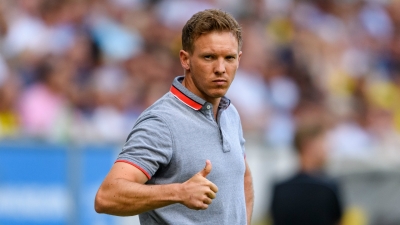Julian Nagelsmann

Image from: freelargeimages.com
Julian Nagelsmann
Current Club/Country: RB Leipzig.
Previous Clubs/Countries: TSG Hoffenheim.
Honours: Germany's Coach of the Year 2016.
Nagelsmann is just 32 years old but is already managing his second Bundesliga club! He became the youngest ever permanent head coach in Bundesliga history when he took at Hoffenheim to replace Huub Stevens, who left mid-season due to ill-health. He would have broken the record anyway, as he was scheduled to take over at the end of the season. It showed what great confidence they had in his man-management skills that a man younger than a large number of the players he was set to coach was chosen.
At the age of 20, Nagelsmann was forced to retire as a player due to injuries and went to college to study a business degree. Realising it was not for him, he dropped out and instead earned a bachelor's degree in sports and training science instead. Nagelsmann showed promise early and received an A grade in his professional coaching license, though he was second in his class to fellow up-and-coming young manager Domenico Tedesco.
Early on he worked as a reserve team coach at Augsburg, but then head coach Thomas Tuchel saw something in him and would use him to scout upcoming opponents. Nagelsmann still credits Tuchel with being the biggest influence on his career and it was there that he first showed signs of being a manager of the future.
Nagelsmann has quickly developed a style of play, despite being nicknamed 'Baby Mourinho', which involves a high press to win the ball close to goal, with an emphasis on quickness. Not in terms of the pace of the players, they are not required to be Usain Bolt, but in terms of ball movement and thought.
His coaching is based on improving a player's touch and control, using the footbonaut while at Hoffenheim, and their mental agility. As well as giving players more responsibility off the pitch, letting them pick their captain and the team's objectives, Nagelsmann likes them to take more responsibility on it.
It is not all about the players though, as he has displayed excellent tactical acumen and an ability to adjust tactics quickly mid-match to adjust to the opponent. Nagelsmann is helped by being a very good communicator who explains things simply and efficiently to players in ways they can understand to cut down on confusion when making changes.
He is always open to new ideas and techniques in order to improve training. It is not just the footbonaut that he uses. At Hoffenheim he also used drones and 4 fixed cameras, one behind each goal and two on a tower high above the halfway line of the main training pitch, to feed footage to a giant videowall next to the tower. Nagelsmann and his assistants would watch the training from the tower and use a tablet connected to the videowall to highlight any issues immediately they were spotted. The pictures could be annotated and illustrations quickly drawn on them via the tablet to make it easy for the players to understand exactly what the problem was. Standing in the tower also allowed the coaching staff a better angle to watch the game.
The players also have scheduled gaming sessions to play games that will improve their play on the pitch. For example the goalkeepers play games that improve their reflexes and powers of concentration. Nagelsmann's thinking is that enhancing a player's brain will allow them to play football at a higher tempo and higher tempo football is much more difficult to stop.
Nagelsmann is also one of a very small number of coaches and players that have signed up for the 'Common Goal' initiative. That involves him giving at least 1% of his salary to charity every month. All in all, I would say he is far from a 'baby Mourinho' and stands to be seen as a top class manager in his own right.
Requested by Becks58